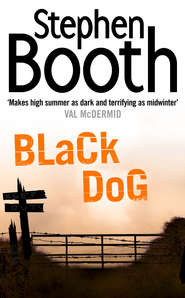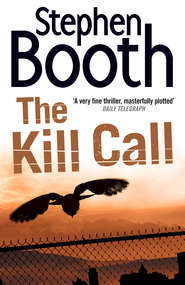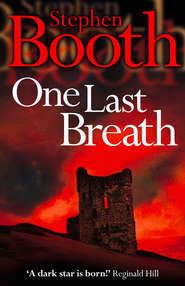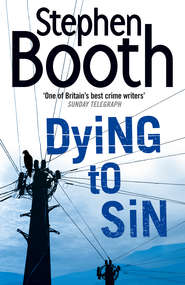По всем вопросам обращайтесь на: info@litportal.ru
(©) 2003-2024.
✖
Scared to Live
Автор
Год написания книги
2019
Настройки чтения
Размер шрифта
Высота строк
Поля
Finally, the car had gone, and Darren began to move again, keeping close to the wall of the cottage to avoid the light as he made his way to the back gate. His blue Astra was parked under the trees on Church Walk. No streetlamps here, not even any houses where he could be overlooked. There was just the old church somewhere in the darkness. If he looked up, and through the trees, he could see the top of its square tower against the sky, with its little stone ramparts like broken teeth.
Darren shuddered when he thought about the church and its graveyard. He’d been scared silly of these places when he was a kid, and even now he preferred to stay away from them. They made him think of bats and vampires, and dead people coming up out of their graves. He’d rather not even go to funerals, if he could avoid it. All those folks dressed in black with their long faces gave him the creeps. He always tried to make an excuse that he was too busy working, and then he’d go along for the sausage rolls afterwards, if he could get away with it.
Why Stella had decided to move here when she got divorced, he had no idea. It wouldn’t suit him at all – it was too far out in the sticks, miles from anywhere and full of old noises who wanted to know every detail of your life. The city was a lot better. You could move around there without anyone knowing who you were or where you’d been. But at least he didn’t have to live in Foxlow himself.
He grinned to himself as he got into his Astra and reversed it in front of the lych gate. A visit to Stella was always worthwhile, he had to admit. As long as no one found out, of course – especially Fiona. That would be a disaster. She’d murder him for sure.
Darren shivered again as he drove out on to the street. But this time it was nothing to do with his superstitions. The village of Foxlow suddenly felt very cold.
A few minutes later, the Shogun had turned at the top of High Street and was being driven too fast down Butcher’s Hill. Its headlights were on full beam, sweeping across the hedgerows, reflecting off gateposts. Anyone coming in the opposite direction would be momentarily blinded, too dazzled to see the vehicle’s model or colour, let alone its driver. In a burst of sodium light, it would be gone as soon as it appeared.
When it reached the bottom of the hill, the Shogun slowed to a halt. It idled for a moment in the road, with its front windows half-open and its engine ticking over. Then the driver swung the wheel to the right. He rammed his foot on the accelerator, and the car surged off the road through an open gateway. Its headlights dipped and swayed as it bumped along the field boundary and followed an uncultivated strip of land close to the hedge. With its four-wheel drive engaged, the vehicle growled towards the top corner of the field, where it turned and coasted along the back gardens of the houses in Pinfold Lane.
Finally, the headlights died and the Shogun rolled the last few yards in darkness. After it stopped, there was silence for a moment, then the whirr of a window lowering, the creak of seat leather as a body shifted position, and the slow, careful scrape of metal. With a final click and a grunt, the movement stopped. From a position near the driver’s seat came a green glow and a faint electronic beeping.
A hundred yards away, in Rose Shepherd’s house, the clock was softly chiming three as the bedside phone began to ring.
2 (#u85de6a30-c750-5369-ab1c-8f2eeb654e00)
Monday, 24 October
Detective Sergeant Diane Fry pushed at the half-open door and stepped carefully past the tape. In the hallway, she had to squeeze past a child’s bike propped against the wall, one wheel off and a spanner on the saddle. She almost tripped over two bulging bin liners full of clothes, ready to go to the charity shop, or maybe the launderette. The smell in the house was overpowering, despite a cold draught blowing through the rooms from the broken windows.
‘Home, sweet home,’ said a voice behind her.
DC Gavin Murfin leaned on the front door, forcing it back against the bin liners with an ominous creak of hinges and a popping of plastic.
‘I hope you remembered to wipe your feet, Diane,’ he said. ‘We wouldn’t want to ruin the décor.’
Fry felt her shoulders stiffen inside her jacket. From the moment she’d entered the house, the fabric of her clothes had begun to feel prickly and uncomfortable, as if the sensitivity of her skin was suddenly heightened, her nerve endings screaming in sympathy with the dead.
‘Shut up for a bit, Gavin, will you?’
Murfin sniffed, and rattled the empty sweet wrappers in his pocket. Fry did her best to ignore him. Everyone dealt with these things in their own way, of course. Gavin’s instinct was to retreat behind a flippant façade. For Fry, the urge was to focus on small details, the trivialities that could so easily be missed if you saw only the big picture.
The first thing she needed to know was how much evidence had been preserved from the original scene, and what had been interfered with. Here, in this house in Darwin Street, she could see at a glance there had been far too much interference. For a start, someone had disturbed the opened post that lay on the hall table, where it lay in a pool of dirty water. She poked at the envelopes with a finger. One of them seemed to be a packet of photographs back from the printers, and another was a BT phone bill. On the bottom were a couple of polling cards for next month’s county council by-election. Some local politician had just lost a voter.
Surrounded by the remains of a family’s day-to-day existence, Fry paused for a moment, listening to the slow drip of water from a ceiling, the crack of a splintered window frame. Her eyes drifted across the muddy carpet to the walls, scratched and gouged by passing equipment – hose reels, breathing apparatus, stretchers. Her attention settled on the incongruous chrome gleam of the spanner, still waiting for someone to pick it up and replace the wheel of the bike.
‘Ugh. The Marie Celeste, with extra charcoal.’
Fry lacked the energy to answer Gavin this time, let alone to shut him up. It was too early in the morning, and she was too depressed at having been on call when something like this came in. Derbyshire’s E Division didn’t catch an incident like this more than once every ten years or so. Of course, Edendale had house fires like anywhere else, but it was bad luck when someone died in one. Today was unlucky all round.
At least the structure of the building was intact. From the street, it had been hard to tell that anything serious had happened, except for the broken windows and the scorch marks where flames had licked the walls. It might just have been a rowdy party that had got out of hand. Inside, it was a different story. Whether the story was anything to do with her, Fry had yet to find out.
Fry tried to tune down her senses as she followed the approach path towards the tape that marked the inner cordon. She realized that the hallway smelled a bit like her kitchen – charred bacon and evaporated steam. When it was her turn to kick the bucket, this was the way she imagined it would be. She’d be a kitchen accident statistic, one more victim of a faulty toaster, killed by an exploding microwave. Death in the throes of breakfast.
At the foot of the stairs, she turned right into the sitting room, keeping carefully to the stepping plates. Judging by what the neighbours reported, the occupants of 32 Darwin Street had been taken by surprise. Six weeks ago, Lindsay Mullen had ordered a new carpet for her lounge. It had a deep, thick pile, and it was a shade of cream Lindsay had always wanted, but her husband insisted wasn’t practical. It would show up the dirt, he’d said. It was a shameful waste of money.
Royal Wilton in chamomile, that was it. According to the uniforms who’d taken initial statements, the lady in the house to the left had heard the entire argument as Brian Mullen left for work one morning.
Fry looked around the wrecked lounge. Mr Mullen had been right. The carpet was black now, and trampled with charred debris. Dozens of boot prints had sunk into two inches of filthy sludge.
The problem was, the bottom edge of the door into the kitchen had sealed so tightly against the new Wilton that there was no gap for air to get through. When the sofa ignited, thick smoke would have filled this room in minutes, choking fumes that seared the lungs and stung the eyes. If only a few wisps of it had seeped under the door into the kitchen, they might have reached the smoke alarm, and the outcome could have been different. Unlike so many others, the Mullens’ alarm had been working, the batteries recently replaced. It just hadn’t detected any smoke until it was too late. Far too late.
‘They never stood a bloody chance, did they?’ said Murfin.
Fry glanced at him. His flippancy was gone, and he was sweating a little despite the draught stirring the curtains behind him. Of course, Gavin was a family man, with children of his own. There were some things that got to you, no matter how hard you tried to keep up the exterior.
‘They say it’s better to die of smoke inhalation than burn to death, anyway,’ she said, though she didn’t expect it to help. Her own flesh still crawled at the thought of the flames.
She looked away from Murfin before he could distract her concentration. This room had been packed with plastics, too – TV, video recorder, racks of CDs and DVDs, boxes full of children’s toys under a shelf in the corner. Most of the toys were just a molten mess now, multi-coloured pools of lava that had run on to the carpet and congealed in the spray from the firemen’s hoses. There were recognizable shapes here and there – the twisted controls of a PlayStation console, the burned edge of a Monopoly game. The head and one arm of a Barbie doll waved from a skin-toned puddle, like someone drowning in a sea of their own flesh. Something scorched and wooden gazed accusingly at her from blackened eyes.
Then a tiny flash of colour caught her attention. A glint of bright yellow, like a drop of sunlight in the blackness. She crouched towards the floor and gently blew away the ash. A broken section of Monopoly board lay at her feet: Piccadilly and the Water Works.
Of course, the untreated polyurethane foam in the furniture had been the real problem. Brian Mullen had definitely had a point. Lindsay could have spent her money more wisely if she’d replaced the cheap sofa instead of the carpet. The outcome really could have been different. For a start, her children might still be alive.
When she walked through into the kitchen, Fry found it almost pristine and untouched, apart from a few muddy footprints on the vinyl flooring. From the condition of the teak-effect units and the white painted walls, she would never have guessed there had been a fire at all. She felt as though she’d stepped out of one film set and into another, where an entirely different story was taking place. This one suggested a harmless domestic comedy – a family eating breakfast together in their spotless kitchen, Mum and Dad and the kids, all chattering and laughing, hurrying to get ready for work or school. Behind her, the other room might have been the scene of a cheap horror film, except the credits had already rolled and the crew had packed up and gone home.
‘Diane, do you want to have a look upstairs?’ called Murfin, without enthusiasm.
‘Yes, in a minute.’
Fry took a last look at the kitchen, with its silent smoke alarm. She noticed that the cooker was new, too. A Smeg dual-fuel with air-cooling system. A thousand pounds or so, she guessed. Money wasn’t all that short in the Mullen household, after all.
She went back through the sitting room and joined Gavin at the foot of the stairs. She wasn’t sure that she needed to visit the bedrooms. They might have been where the victims died, but they weren’t where the fire had started. If there had been a crime committed, it was here on the ground floor that the evidence would be found, surely?
As she was debating with herself, Murfin settled the question by hauling himself slowly up the stairs, sighing at every step. Fry had no choice but to follow him.
And, in a way, the bedrooms weren’t quite so bad. It was clear that the flames hadn’t reached here. The furniture was almost untouched, though covered by a layer of soot. The covers of the beds had been pulled back, revealing clean, unmarked sheets. The first room she saw might simply have been waiting for Lindsay Mullen to come home and clean up the mess. Apart from the markers where her body had lain when she collapsed from smoke inhalation, of course.
‘Have you got the photos there, Gavin?’
Murfin grunted and passed her the file. Fry had seen the photographs before she came out, and remembered the condition of Lindsay’s body, the cotton pyjamas she’d been wearing, with the left leg rucked up to expose a thin, white calf. Her face was only visible in the close-ups, turned to the right, her left cheek pressed tightly to the floor.
It wasn’t Lindsay Mullen’s face that Fry was interested in, but the position of her body, the angle of her limbs. She turned one of the photos to align it with the room, and checked the direction of the door. Lindsay had almost certainly been going the wrong way. It wasn’t too difficult to picture her, blinded and disorientated by darkness and dense smoke, feeling her way frantically round the walls in an effort to find the door, while her children screamed in the next room. It wasn’t difficult at all. In fact, it was too easy for comfort.
‘Next room, Gavin,’ she said.
‘That’s the kids’ bedroom.’
‘I know that.’
Jack and Liam Mullen had died without leaving their beds, according to the incident reports. They woke up choking, and died from the effects of smoke inhalation. Died calling for their mum, probably.
The house must have been so full of smoke by then that the boys would never have made it to the stairs, let alone through the flames in the hall. Still, their bedroom wasn’t a pleasant place to be. Gavin wouldn’t even come inside the door. He knew the bodies had lain here for some time, since the boys had obviously been dead and beyond rescue. Coroners’ rules required the bodies to be left in situ until forensic evidence had been gathered to establish the cause of death.
Of course, the vast majority of house fires were tragic accidents. Faulty wiring, a fag down the back of the sofa, clothes left too near an electric heater. If sudden deaths didn’t go automatically to CID, she wouldn’t even be here. Fire service codes on this incident were ambiguous – but then, the firefighters on the scene would have had other priorities than looking for a cause.











